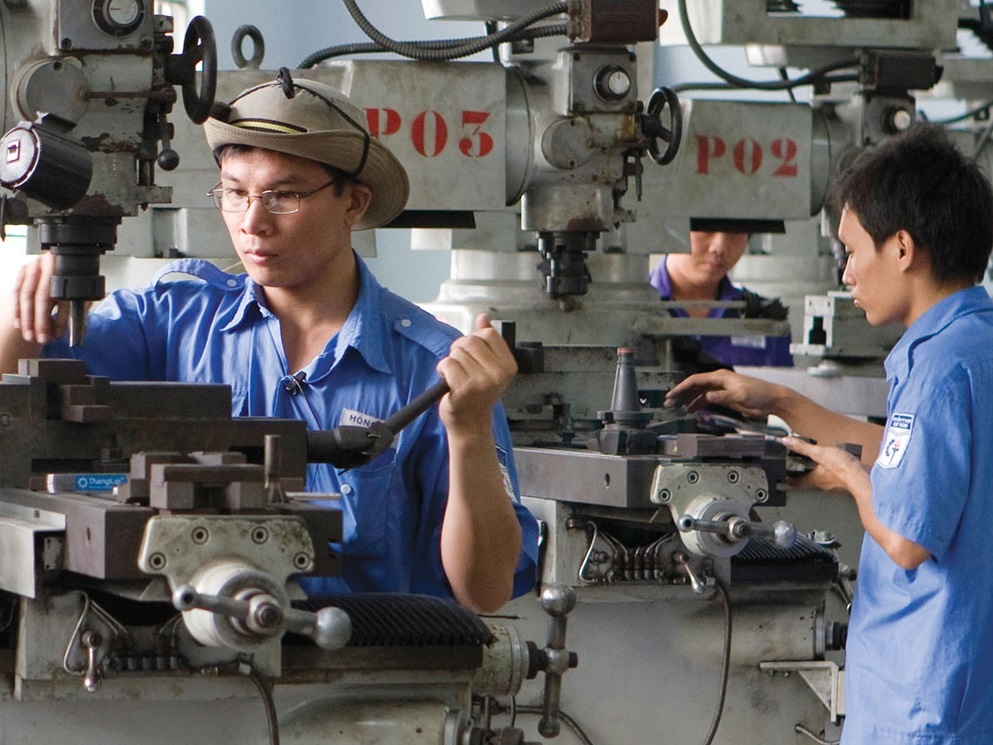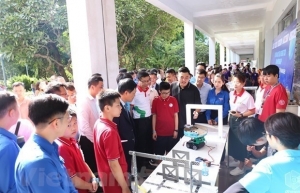Support necessary to boost green human resources
What is Australia’s experience in attracting and engaging more industry participation in the vocational education?
 |
| Jen Bahen |
Australia has a very mature bid system, but we didn’t get there overnight. The journey of Australia’s bid system has taken around 30 years to develop, and we’ve had lots of consultation with industry and with governments and with education providers to get to the point where we’re at today.
We remain on the journey as the industry evolves and the needs of learners evolve, so we’re thrilled to share some of those lessons with Vietnam and hope that we can help it skip some of the years of our journey and move a little bit more quickly towards the mature event system.
There are four areas that we need to look at within Vietnam to help support that development. The first is the role of industry. It is critical that industry values vocational education and training is able to work with education and training providers to identify the sorts of training that providers might give to graduates. This is to make sure that when graduates finish at a vocational college, they are ready to participate in industry. We can’t do any of this without industry being centrally and critically involved.
The second area is the role of education and training providers to not teach in the way that we might teach in a university, but to teach hands-on learning and to ensure that graduates not only know how to do skills in their mind, but can actually carry them out on the job.
The third area is the role of governments to make sure they have a system that industry, education, and training providers and individuals can follow that has some things embedded within legislation.
Finally, we need to make sure that parents and students understand the value of vocational education and training to them and their careers, make sure that they’re not just looking at a university qualification but also considering a very valuable pathway.
How do you evaluate the quality of Vietnam’s human resources compared to other countries in Southeast Asia?
Australia is proud to be a key partner in Vietnam’s aspirations to build a highly skilled and dynamic workforce. Over 25,000 Vietnamese students are studying in Australia, and we celebrate over 80,000 Vietnamese alumni who are now contributing in all parts of Vietnam’s economy.
 |
| Vocational education helps to ensure that the correct type of training is accessible to those who will require it in their careers, Le Toan |
We also work in partnership with many Vietnamese institutions to deliver Australian qualifications right here in Vietnam, including, but certainly not limited to, RMIT Vietnam.
Programmes such as our significant Aus4Skills investment enable Australia and Vietnam to work together to build high-quality technical and vocational education and training (TVET) and higher education systems to better support human resource development for all members of the community.
Vietnamese workers are resilient, resourceful, and entrepreneurial. However, whilst Vietnam has made significant advances in human resource development, especially in basic education, continued economic growth will be constrained by the lack of a skilled workforce across a number of important industry sectors.
Vietnam especially needs workers who are trained vocationally, however less than 10 per cent of Vietnam’s young people have undergone such education and training – in Australia and other regional partners, that number is closer to 20-25 per cent.
It is important that Vietnam continues to develop a TVET system that has strong levels of industry engagement, and that demonstrates young people can access high-quality jobs quickly after graduation. The Aus4Skills project, which is focused on the critically important logistics sector, has shown what can be achieved when industry, training colleges and governments come together to create a TVET system that is innovative and responsive.
The project has shown better graduate outcomes for youth and more success in meeting the needs of industry, success that has stemmed from including businesses in the design, delivery and assessment of TVET courses. The learnings from this project can be applied across other important industry sectors, and we look forward to working with the government of Vietnam to realise that.
Connections between TVET and higher education are important, and allow workers to access lifelong learning and progress throughout their careers. It is equally important to retain a focus on inclusion. This includes ensuring women are able to access roles in a wide variety of industry sectors, and that workers from rural areas, ethnic minority backgrounds, and those with a disability can be much better represented in Vietnam’s system.
How can vocational skills be improved for Vietnamese workers, helping them keep up with the 4.0 revolution and the green job transformation process that is taking place strongly in Vietnam?
The rapidly changing labour market is putting pressure on TVET systems globally, with the skills needed by industry impacted by a range of factors including digitalisation, disruption to supply chains, and political and social issues.
It is clear that Vietnam places a high priority on human resource development, as shown by the prime minister’s release of a TVET development strategy for 2021-2030. This strategy has a focus on equity, quality and lifelong learning, but also includes a commitment to training for the roles of the future, especially in green job transformation and the digital economy.
This is a challenge that Australia shares, as our economy and communities also transition towards digitalisation and to net-zero. We also have a shortage of skilled workforce critical to supporting green industries, for example electricians with the skillset to install solar panels or e-vehicle charging stations. Incorporating job market planning and skills development into national policies is crucial to all sectors, not least the green transition and digital transition.
Australia is willing to share our experience in how we are transitioning to a green economy and digital economy, and support Vietnam to manage these challenges, particularly in upskilling human resources.
In Australia, we have legislated a national net zero authority to ensure the workers, industries, and communities in the conventional power sector can seize the opportunities of Australia’s net-zero transformation. The authority supports workers in emissions-intensive sectors to access new employment, skills and support as the net-zero transformation continues.
We also established new energy apprentices and skills programmes, training 10,000 new energy apprentices in jobs for the future and investing in a new energy skills initiative to tailor skills training to the specific needs of new energy industries.
TVET is especially important in supporting these transformations, and Australia continues to work in partnership with Vietnam and the region to support skills development. Under the Aus4ASEAN Digital Transformation and Future Skills initiative, we are providing short courses for TVET on green skills and inviting applications from ASEAN countries to attend these courses in Australia.
The short course will facilitate an exchange of knowledge on incorporating green skills in TVET training, and we continue to welcome Vietnamese participants.
 | Getting a head start with a big push - developing quality human resources for Vietnam Despite significant economic progress since the 1980s, Vietnam is at risk of falling into the middle-income trap, which denotes the tendency for productivity growth to slow as countries exhaust easy gains from early-stage growth strategies. |
 | Vietnam wants high-quality human resources training in STEM Vietnam needs a comprehensive investment strategy and support policies to encourage universities to invest in the education of high-quality STEM (Science, Technology, Engineering and Mathematics) professionals, thereby laying the groundwork for the country's scientific and technological advancement, educational experts have said. |
What the stars mean:
★ Poor ★ ★ Promising ★★★ Good ★★★★ Very good ★★★★★ Exceptional
Related Contents
Latest News
More News
- Ho Chi Minh City launches plan for innovation and digital transformation (February 25, 2026 | 09:00)
- Vietnam sets ambitious dairy growth targets (February 24, 2026 | 18:00)
- Masan Consumer names new deputy CEO to drive foods and beverages growth (February 23, 2026 | 20:52)
- Myriad risks ahead, but ones Vietnam can confront (February 20, 2026 | 15:02)
- Vietnam making the leap into AI and semiconductors (February 20, 2026 | 09:37)
- Funding must be activated for semiconductor success (February 20, 2026 | 09:20)
- Resilience as new benchmark for smarter infrastructure (February 19, 2026 | 20:35)
- A golden time to shine within ASEAN (February 19, 2026 | 20:22)
- Vietnam’s pivotal year for advancing sustainability (February 19, 2026 | 08:44)
- Strengthening the core role of industry and trade (February 19, 2026 | 08:35)

 Tag:
Tag:



















 Mobile Version
Mobile Version